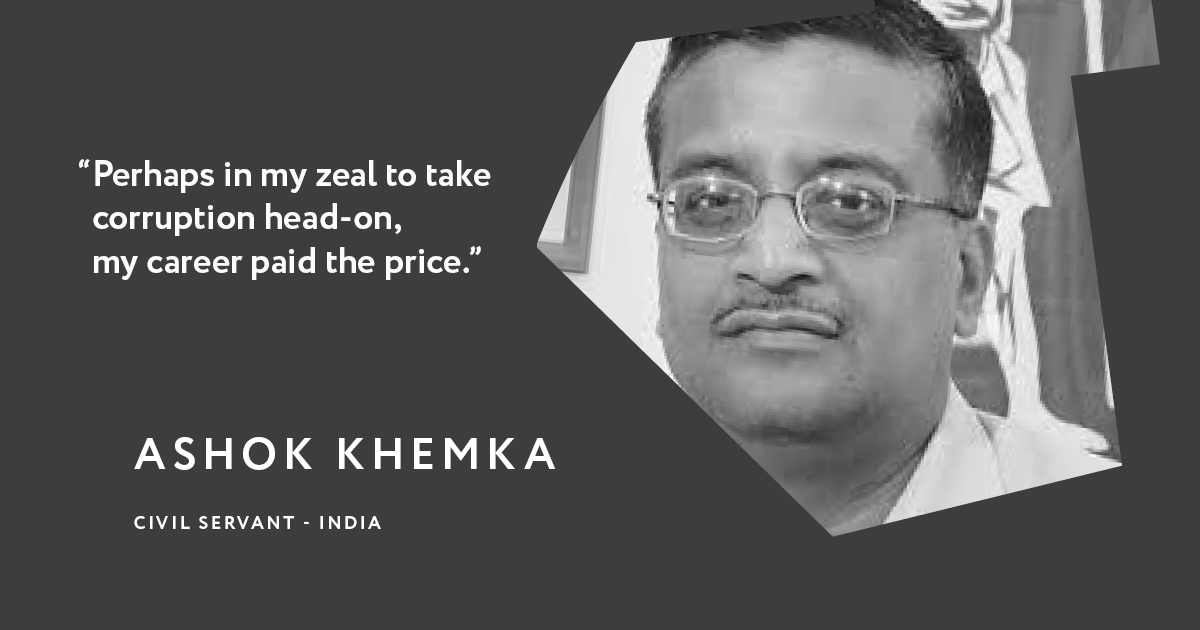
Welcome to our interview series featuring changemakers across Asia, where we delve into policy and change processes that are shaping the region.
In this article, Annapoorna Ravichander, Executive Director of the Public Affairs Foundation in Bengaluru, India, talks to Ashok Khemka, an Indian civil servant known for his commitment to honesty and integrity within his public service. In 2011 he received the S.R. Jindal Prize along with Sanjiv Chaturvedi, for their “Crusade against Corruption” activities, and in 2009, he was given the Manjunath Shanmugam Trust Commendation for Public Works.
Question: Please introduce yourself!
I was born into a humble, middle-class family. My family had migrated from the district of Jhunjhunu (Rajasthan) to Kolkata (Bengal) circa 1900. I was fortunate to imbibe the best of both the Shekhawati and the Bengali cultures.
My schooling was in Calcutta, the City of Joy and the intellectual capital of India. After graduating with a grade point average of 9.87/10 in Computer Science from the Indian Institute of Technology, I had ready the option to migrate to the USA, as was fashionable then.
It was not difficult to get into the Ivy League, but with a deep sense of abiding duty, I chose to stay back. I joined the Tata Institute of Fundamental Research (TIFR), Mumbai for a Ph.D. programme.
My becoming a public administrator was a matter of serendipity. During my stay in Mumbai, I came in contact with a relative who was in the Civil Services. He motivated me to join the government.
Since my student days, I had been an active participant in social and political issues, and I believed that my potential would be put to good use in the government. Hence, I took a diversion from a career in research to a career in the Civil Service.
Q: You have been widely recognised for your commitment to public service and your unwavering honesty and integrity. Where did this drive come from?
I chose a career in the Civil Service due to a deep and abiding commitment to justice. The Service provides enough for our needs, through temptation always lurks around. Therefore, remaining contented and grateful are essential to maintaining integrity.
Q: What are some of the achievements you’re most proud of during your years of service?
In public service, it is always teamwork. No achievement is individual.
Some of the things I was involved with, and which come to mind, are efforts towards a more decentralised district administration, preventing over-exploitation of groundwater, reducing demand for asbestos containing materials, Direct Benefits Transfer, reforms in the transport sector, sports policy etc.
However, an effort which brings even a small change in the life of an ordinary man brings great satisfaction.
To me, remedying any injustice against those without a voice has been a cherished moment.
Public corruption is a disease which has infested the Nation like a termite. I am more known in the country as an anti-corruption crusader. But my inter-disciplinary abilities in areas of economics, finance and law is something I hold closer.
Q: What have been the biggest challenges you’ve faced in performing your duties?
The biggest challenge has always come from the vested interests. Touching them is not easy.
Having developed a reputation of an intelligent but an unyielding officer, I was transferred a lot. I believe that my full potential was not put to best use due to frequent transfers and inconsequential postings.
Perhaps in my zeal to take corruption head-on, my career paid the price.
Q: From your experience, what can you tell us about how evidence is used in decision-making within the Indian Administration?
We have to walk some distance towards a more evidence-based decision making in the states.
However, the NITI Aayog and various sectoral regulators at the national level, like the Telecom Regulatory Authority of India (TRAI), Competition Commission of India (CCI), Insurance Regulatory and Development Authority (IRDAI), Central Electricity Regulation Commission (CERC), Securities and Exchange Board of India (SEBI), Reserve Bank of India (RBI) place greater reliance on data and other evidence in their respective decision-making.
Q: Are there any other insights from your life and work that you would like to share with our readers?
- Acquire competency.
- Work with passion.
- Develop courage ‘to do’ what is right and ‘resist’ what is wrong.


 Previous
Previous
